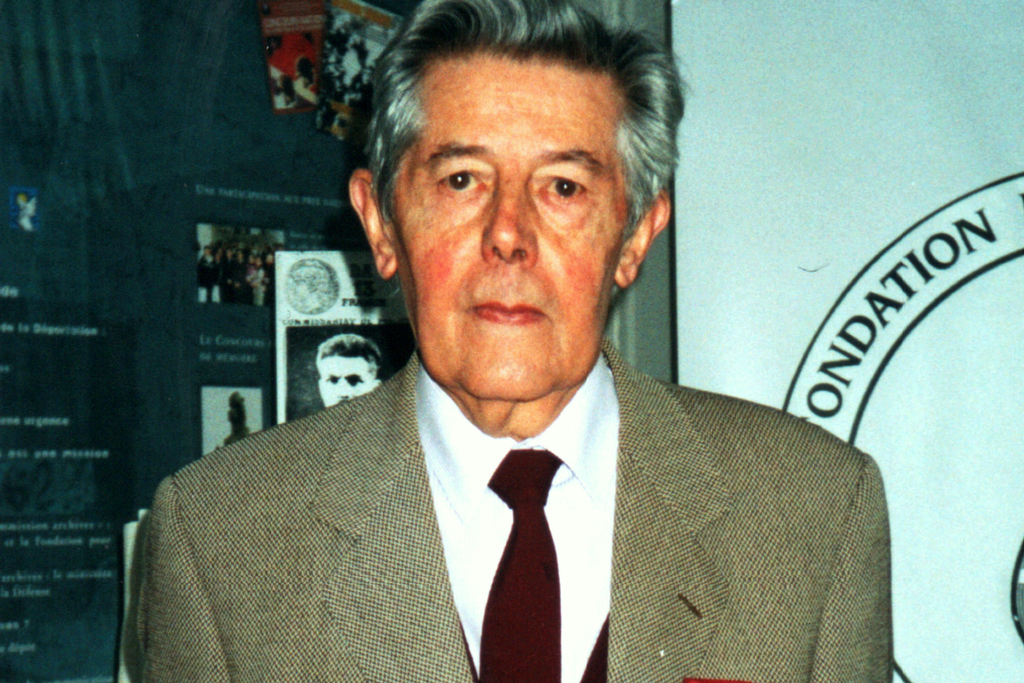Obituary for Jean Gavard
19.08.2016

From Paris we have received the message that on 4 August M. Jean Gavard, former member of the Résistance and prisoner at Gusen, has died at the age of 94 at Garche near Paris.
Jean Gavard was born on 16 May in Belgium. Because of the economic crisis of the 1930s, his family relocated to France and took residence near Bordeaux. When a part of France was occupied by the Germans in summer of 1940, the Lycée student joined the resistance network Confrérie Notre-Dame Castille. This network was based at ports extending from the Atlantic Ocean to the North Sea, from Bordeaux to Antwerp, furnishing London with information about activities in the Northern Atlantic of the German Kriegsmarine, which sought to cut off England’s supply lines from the United States of America and Canada: such information was most essential in 1940-1941, when convoys of the American merchant navy helped isolated England to put up resistance against the Nazis.
On 10 June 1942, Jean Gavard was arrested, just as he was about to take the entry exam to the university. Together with his comrades from the resistance - mostly young students - he was transferred to the Gestapo headquarters in Paris for interrogation, their network being the first large information network in France to be dismantled by the Nazis. He was kept alone in a prison cell in Paris for ten months, every day awaiting his execution. Subsequently, he was deported to the Mauthausen Concentration Camp on 25 March 1943 in the first “Night and Fog Convoy” from Paris and transferred to Gusen on 7 April 1943, where he first worked at the quarry, and later at the “Steyr” gun factory. He was liberated from the Central Camp on 5 May 1945, but his physical conditions did not allow him to return to France right away. On 18 May 1945, he was taken to the American military hospital, which had been installed at Gusen, and his life was saved in extremis by the personnel of the 131th Evacuation Hospital.
He returned to France on 1 June 1945 in an extremely bad physical condition, and could only resume his law studies at the university in 1947 - with a delay of five years. Educated to be an administration specialist for educational and university establishments, he became General Inspector for the Administration of National Education and Research. As Vice-President of the Résistance Foundation and of l'Amicale de Mauthausen, Jean Gavard fought against the Holocaust denial movement in the 1980s by endorsing the French translation of the work «Les chambre à gaz, secret d’état» [The Gas Chambers, A State Secret] by Eugen Kogon, Adalbert Rückerl and Hermann Langbein.
Jean Gavard was also a great purveyor of memories. He bore witness to this in his book “Une jeunesse confisquée” [A Confiscated Youth] 1940-1945, published in 2007. He also bore witness to this when speaking in educational establishments, and for ten years he chaired the jury of the Concours National de la Résistance et de la Déportation [National Competition of Résistance and Deportation]. This competition prompts tens of thousands of young people in France every year to work on behalf of the memory of deported persons and members of the resistance. In the early 1990s, together with his deportation comrades from l'Amicale de Mauthausen, he organised the visits of several hundred school professors to the Mauthausen and Gusen Memorials. The stones thrown at him and his comrades by Austrian children on 27 March 1943, when they arrived at the train station of the Central Camp, had bruised him deeply for the rest of his life: until his last day, on 4 August 2016, he fought for the recollection of Nazi crimes to be preserved, and for civic education, especially for the younger generation.
We mourn for Jean Gavard.